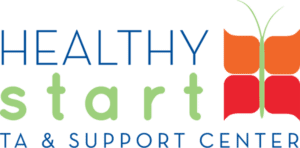Overview
Project Directors/Managers are responsible for establishing a staffing model and assembling staff with the skills and expertise to successfully deliver high-quality and effective services to Healthy Start (HS) participants. HS projects are made up of multiple staff members with a wide variety of skills. For more information about the different types of staff that make up a HS project, see Staff Roles. Human resources involves recruiting staff, building your culture, onboarding staff, and retaining staff.
Overseeing Human Resources
Building an effective HS team begins with hiring the right employees, including people who are reflective of the community you serve, understand the work that you do, and share in the vision of the HS program. Recruit staff directly from your community by advertising open positions on social media, in community newsletters, at local businesses, and on local school job boards.
It is essential that all members of your HS team feel valued. Cultivate an environment of trust, open communication, and collaboration. Each member of your team has a unique perspective on the work that you do, so all team members should be encouraged to share their ideas and insights. Establish team values and goals, set ground rules around resolving conflict, and ensure staff know where to turn for support. Lastly, be sure to make time for celebrating achievements, success, and the great outcomes that can be achieved through teamwork.
It is important to make new staff feel welcome and that they are valued members of your team. Provide an orientation that introduces new employees to your backbone organization, HS project, role, and community. You might consider pairing new staff with an experienced staff member who can serve as a mentor. This helps new staff become acclimated more quickly and helps experienced staff stay motivated and dedicated to their work. Be sure to check in regularly with new staff to ensure they feel supported in their new role.
Each of the eleven modules focuses on one of the core competencies for Healthy Start Community Health Workers. The first five modules cover the knowledge-based competencies related to Healthy Start itself and the four perinatal phases: Healthy Start 101, Preconception/Interconception Health, Prenatal Health, Postpartum Health and Parenting & Child Development. The remaining six modules cover Scope of Practice & Core Values as well as the core competencies related to key CHW roles in Healthy Start: Outreach, Participant Screening & Community Assessment, Health Education, Care Coordination, and Participant Empowerment & Community Engagement.
Each module begins with a statement of learning objectives and ends with a knowledge check to assess the user’s understanding of key concepts covered in the module. Each module is composed of 10-15 “units” covering important subtopics or interactive learning activities. Units take anywhere from 5 minutes to 60 minutes to complete, depending on what kind of content they include.
Your team is your most valuable asset. Your staff build strong relationships with community members and employee turnover can damage those relationships and undermine continuity of services. Staff retention can be supported by:
- Hiring the right people from the start.
- Using data to show your employees how your HS project and staff’s individual contributions are making a difference in your community
- Ensuring that staff feel comfortable expressing their needs, concerns, and goals.
- Maintaining a healthy work-life balance.
- Training staff on dealing with stressful situations.
- Compensating staff equitably.
- Providing opportunities for staff professional development
- Promoting from within whenever possible.
Relevant Resources
Performance Appraisals: Provides guidelines for how to conduct a performance review, how to facilitate goal setting, tips for evaluating performance, and pitfalls to avoid.
- Recording
- Recording
- Recording
- Recording
- Recording
- Recording
